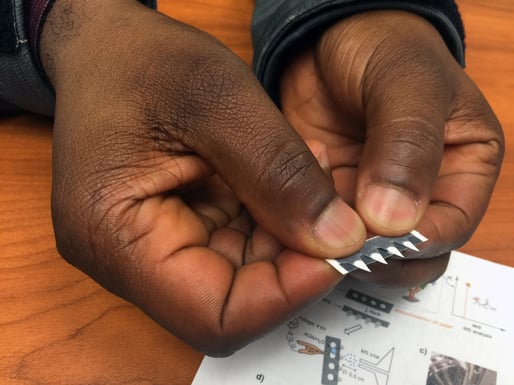
(Image courtesy of Wikimedia Commons)
Dr. Abraham Badu-Tawiah, assistant professor at Ohio State University, is out to revolutionize the world of diagnostic testing. By making paper strips that can detect malaria and well as certain types of cancers, he hopes to make testing more practical and affordable. People would be able to simply apply a drop of blood to the paper test strip at home, much like diabetics do when testing their blood sugar, and then mail it to the laboratory. This new method would make medical diagnostics much more accessible for those who can't easily get to a lab for testing.

(Image courtesy of Ohio State University)
How do the paper strips work?
According to the article on the University’s news site, this technology that is being developed by chemists at Ohio State University resembles current “lab on a chip” diagnostic; however, instead of plastic, these “chips” are made from sheets of plain white paper stuck together with two-sided adhesive tape. They are ran through a regular ink-jet printer that uses wax ink to create channels and reservoirs. The wax penetrates the paper and forms a barrier that captures the blood sample and keeps it between the layers.
These paper strips contain small synthetic chemical probes that carry a positive charge. The ionic probes are designed to tag specific antibodies that extract the biomarker of a disease from the blood and transfer it to the paper chip. Once there, the chemicals stay unchanged until the paper is dipped in an ammonia solution at the lab. The paper layers are pulled apart and the chemical probes allow for detection of biomarkers by a handheld mass spectrometer.
This technology is different than other paper-based medical diagnostics, such as home pregnancy tests, because it does not rely on enzymes to change the paper’s color. This technique is important for home tests that will have to be mailed to a lab. Dr. Badu Tawiah explains, “Enzymes are picky. They have to be kept at just the right temperature and they can’t be stored dry or exposed to light…But the ionic probes are hardy. They are not affected by light, temperature, humidity—even the heat in Africa can’t do anything to them. So you can mail one of these strips to a hospital and know that it will be readable when it gets there.”
Why is this important?
Because Badu-Tawiah and his colleagues have already proven that this new method can detect the protein biomarkers for the most common malaria parasite. According to the Centers for Disease Control and Prevention there were 214 million cases of malaria worldwide last year and 438,000 deaths. Most of these cases were in Africa. UNICEF estimates that malaria costs the continent $12 billion in lost worker productivity every year. Since the antibody strips are reliable for over 30 days, these tests can get to a lab by mail. This could make it possible to test people in rural communities that otherwise might go undiagnosed. “Although this approach requires an initial investment, we believe the low-cost paper-based consumable devices will make it sustainable,” Badu-Tawiah said. “We can set one small instrument at a grocery store, then sell the paper strips for just 50 cents per test. The same for Africa, and perhaps much cheaper there.”
The other amazing thing about this technique is that it can be used to detect some forms of cancer. So far it has successfully been used to detect the protein biomarkers for ovarian cancer and cancer of the large intestine. However, the Journal of the American Chemical Society reports that in the future the test strips should be able to be tailored to detect any disease that causes the human body to produce antibodies. This could be a huge breakthrough for people with a family history of cancer or that have been successfully treated and want to confirm that they are still in remission.
More About Ohio State University, Columbus
On October 6, 2016, Biotechnology Calendar, Inc. will host the 17th Annual BioResearch Product Faire™ Event at Ohio State University, Columbus. This event brings lab suppliers face to face with science professionals so they can demonstrate their lab products. Researchers attend for free! Laboratory equipment suppliers interested in increasing their brand awareness should contact Biotechnology Calendar, Inc. at (530) 272-6675, or visit the link below for more information.


